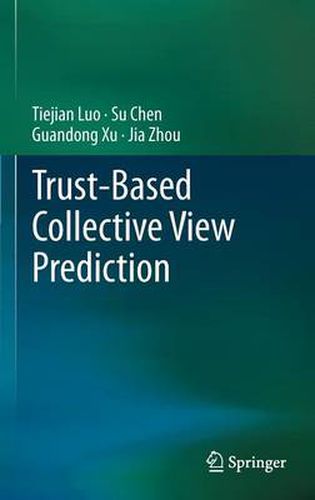Readings Newsletter
Become a Readings Member to make your shopping experience even easier.
Sign in or sign up for free!
You’re not far away from qualifying for FREE standard shipping within Australia
You’ve qualified for FREE standard shipping within Australia
The cart is loading…






This title is printed to order. This book may have been self-published. If so, we cannot guarantee the quality of the content. In the main most books will have gone through the editing process however some may not. We therefore suggest that you be aware of this before ordering this book. If in doubt check either the author or publisher’s details as we are unable to accept any returns unless they are faulty. Please contact us if you have any questions.
Collective view prediction is to judge the opinions of an active web user based on unknown elements by referring to the collective mind of the whole community. Content-based recommendation and collaborative filtering are two mainstream collective view prediction techniques. They generate predictions by analyzing the text features of the target object or the similarity of users’ past behaviors. Still, these techniques are vulnerable to the artificially-injected noise data, because they are not able to judge the reliability and credibility of the information sources. Trust-based Collective View Prediction describes new approaches for tackling this problem by utilizing users’ trust relationships from the perspectives of fundamental theory, trust-based collective view prediction algorithms and real case studies.
The book consists of two main parts - a theoretical foundation and an algorithmic study. The first part will review several basic concepts and methods related to collective view prediction, such as state-of-the-art recommender systems, sentimental analysis, collective view, trust management, the Relationship of Collective View and Trustworthy, and trust in collective view prediction. In the second part, the authors present their models and algorithms based on a quantitative analysis of more than 300 thousand users’ data from popular product-reviewing websites. They also introduce two new trust-based prediction algorithms, one collaborative algorithm based on the second-order Markov random walk model, and one Bayesian fitting model for combining multiple predictors.
The discussed concepts, developed algorithms, empirical results, evaluation methodologies and the robust analysis framework described in Trust-based Collective View Prediction will not only provide valuable insights and findings to related research communities and peers, but also showcase the great potential to encourage industries and business partners to integrate these techniques into new applications.
$9.00 standard shipping within Australia
FREE standard shipping within Australia for orders over $100.00
Express & International shipping calculated at checkout
This title is printed to order. This book may have been self-published. If so, we cannot guarantee the quality of the content. In the main most books will have gone through the editing process however some may not. We therefore suggest that you be aware of this before ordering this book. If in doubt check either the author or publisher’s details as we are unable to accept any returns unless they are faulty. Please contact us if you have any questions.
Collective view prediction is to judge the opinions of an active web user based on unknown elements by referring to the collective mind of the whole community. Content-based recommendation and collaborative filtering are two mainstream collective view prediction techniques. They generate predictions by analyzing the text features of the target object or the similarity of users’ past behaviors. Still, these techniques are vulnerable to the artificially-injected noise data, because they are not able to judge the reliability and credibility of the information sources. Trust-based Collective View Prediction describes new approaches for tackling this problem by utilizing users’ trust relationships from the perspectives of fundamental theory, trust-based collective view prediction algorithms and real case studies.
The book consists of two main parts - a theoretical foundation and an algorithmic study. The first part will review several basic concepts and methods related to collective view prediction, such as state-of-the-art recommender systems, sentimental analysis, collective view, trust management, the Relationship of Collective View and Trustworthy, and trust in collective view prediction. In the second part, the authors present their models and algorithms based on a quantitative analysis of more than 300 thousand users’ data from popular product-reviewing websites. They also introduce two new trust-based prediction algorithms, one collaborative algorithm based on the second-order Markov random walk model, and one Bayesian fitting model for combining multiple predictors.
The discussed concepts, developed algorithms, empirical results, evaluation methodologies and the robust analysis framework described in Trust-based Collective View Prediction will not only provide valuable insights and findings to related research communities and peers, but also showcase the great potential to encourage industries and business partners to integrate these techniques into new applications.